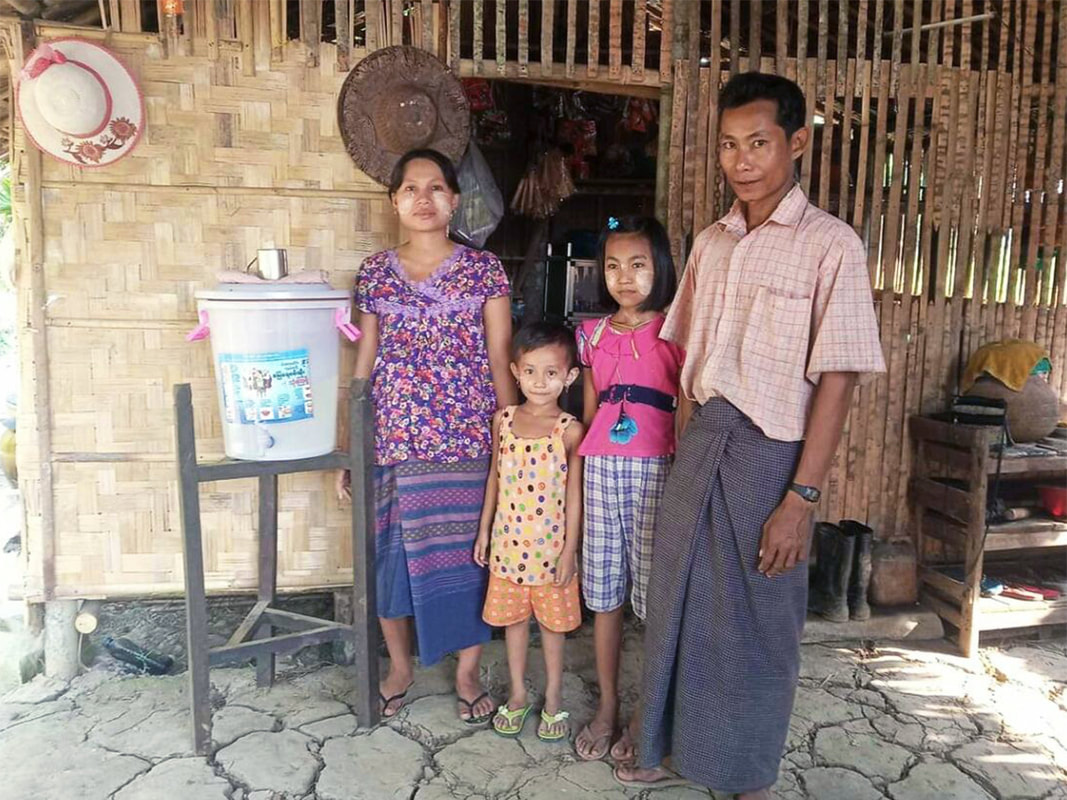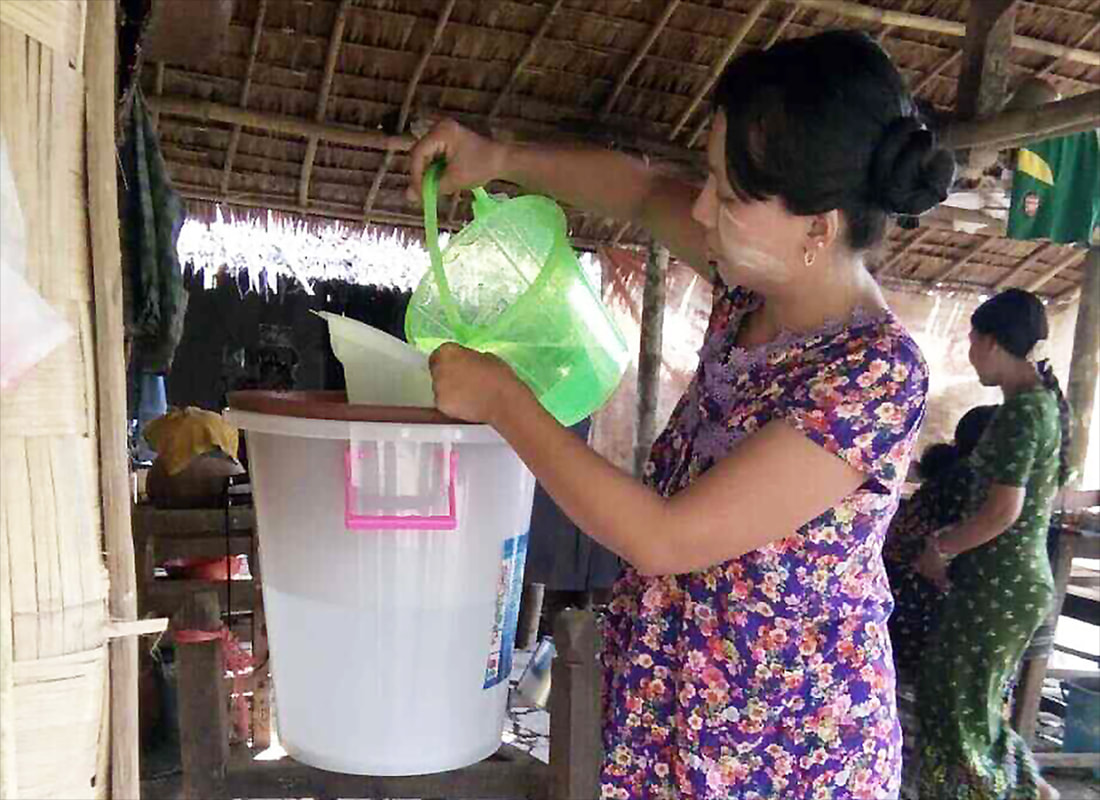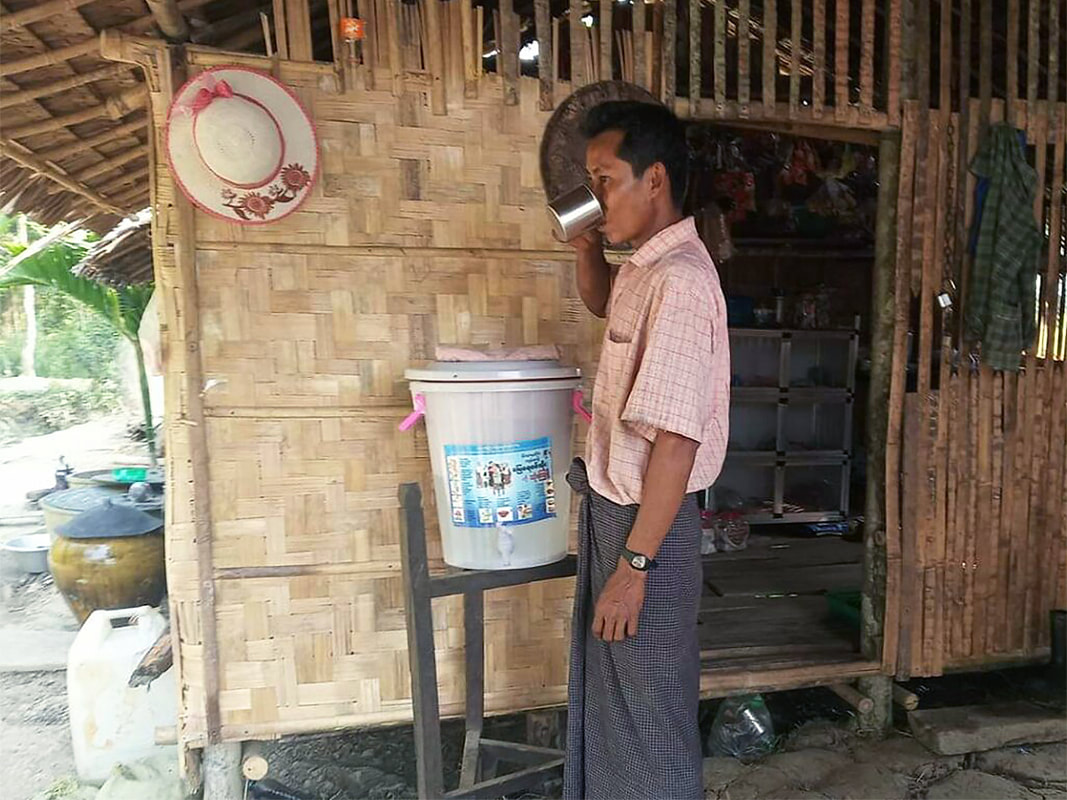|
Ma Yin Shwe Aye lives with her husband and two daughters, aged 5 and 10, in their modest bamboo house in Kyaw Nu village, Myanmar. The village is situated in Mawlamyinegyun township of the Ayeyarwady Delta region in the southwest of Myanmar. In the dry season, when they can't collect rainwater, the family draws water from a nearby creek, but Ma Yin Shwe Aye worries that this water might not be good for her children's health. In July 2018, the family started using a new ceramic filter as part of a community-based project supported by Community Partners International (CPI). We visited the family in March 2019 to find out how they were getting on with the new water filter. This Ayeyarwady Delta region is low-lying and predominantly rural. Agriculture and aquaculture are important sources of livelihoods. The vast waters of Myanmar’s largest river, the Ayeyarwady, drain through a complex network of waterways that crisscross the region and ultimately discharge into the Indian Ocean and the Gulf of Martaban. As a low-lying coastal region, the Ayeyarwady Delta is vulnerable to cyclones and flooding. In 2008, Cyclone Nargis devastated the region, with at least 138,000 people losing their lives in strong winds and storm surges. Ma Yin Shwe Aye and her husband have a combined daily income of around 5,000 Myanmar kyat (c. $3.3) which they earn through farming and operating a small shop. While there is usually no shortage of water in this region of Myanmar, access to clean drinking water can be difficult for low-income households. During the wet season, Ma Yin Shwe Aye and her family collect rainwater to drink. However, during the dry season, they have to collect water from a nearby creek and Ma Yin Shwe Aye is concerned that it is not good for their health. “I worry that the water from the creek is not safe for my children,” she says. “They sometimes get diarrhea that could be caused by drinking dirty water.“ To purify the creek water, they add aluminum sulfate to remove sediment and then boil it. However, this process is time consuming and uses a lot of cooking fuel. In 2018, Community Partner International (CPI) launched a project called ‘Better Homes, Better Lives’ in partnership with a community-based organization in Mawlamyinegyun called Baythitsardana. With support from a private donor, CPI and Baythitsadarna are supporting women’s groups in five villages in to lead key improvements in health, clean water access, sanitation and hygiene, education, lighting and community infrastructure. One of the priorities identified by the women’s groups was the need to access clean water during the dry season. CPI brought in a nonprofit partner, Thirst-Aid, who manufacture low-cost, durable, easy-to-use ceramic water filters using materials sourced in Myanmar. Their filter consists of a ceramic bowl made from clay mixed with rice husks and colloidal silver (an antibacterial agent) that sits on the rim of a large plastic bucket with a tap at the base. Water is poured into the ceramic bowl, and slow filters through, dripping into the plastic bucket from which it can then be drawn and drunk. Thirst-Aid advocates a holistic approach to safe-water practices, combining technology with education, training, and social marketing to promote behavior change. Working alongside Baythitisadarna’s village-based health workers, CPI and Thirst-Aid met with the communities and presented the water filter. Households were offered the option of a cost-share purchase option, with CPI paying half of the cost, and the households covering the other half through a series of affordable monthly installments. The filters cost 16,000 Myanmar kyat in total (c. $10.55) so, with the cost-share, households need to pay 8,000 Myanmar kyat (c. $5.27). CPI adopts this cost-share approach so that households purposefully choose to acquire the filter on the basis of need, and have a stake of ownership which will encourage them to regularly use and maintain the filter. In total, 176 households in the five villages opted to purchase a water filter through the ‘Better Homes, Better Lives’ project. Ma Yin Shwe Aye’s household was among them, and she has now been using the new water filter for eight months. “It was easy for us to purchase the filter because the cost is low and we were able to pay in installments,” she says. “It’s also easy to use, and we trained how to use it and maintain it. I maintain the filter by regularly cleaning it and checking for cracks. I keep it in a safe place so the children won’t break it when they are playing.” “The filter provides enough drinking water for all of us,” she continues. “The water tastes good. When we first started using the filter, the water had a slight earthy smell, but that has now gone. I have noticed improvements in my children’s health since we started using the filter. They rarely get diarrhea now.” “I have encouraged other households in the village to get this water filter. It is good for our health. In the past we were offered other filters but they were too expensive. This model is affordable for us, and it is easy to use.” CPI will continue to work closely with the women’s groups in Mawlamyinegyun to support sustainable improvements in living conditions as prioritized by the women themselves.
Comments are closed.
|
AuthorCPI Admin Archives
July 2024
Categories
All
|
|
|
COMMUNITY PARTNERS INTERNATIONAL
580 California St Fl 16, Ste 1658, San Francisco, CA 94104-1068, USA [email protected] +1 510 225 9676 We are a registered nonprofit 501(c)(3) Public Charity. TAX ID 94-3375666 |
©
Community Partners International




 RSS Feed
RSS Feed
